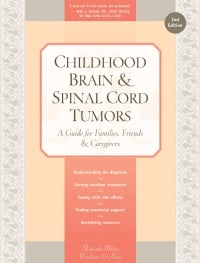Childhood Brain and Spinal Cord Tumors
Choosing a transplant center
If the institution where you child is treated is also an accredited transplant center, you will not need to travel for this part of your child’s treatment. However, if you need to choose a transplant center, it is an important and often difficult decision. Institutions may just be starting a stem cell transplant program, or they may have vast experience. Some centers may be excellent for adults, but have limited pediatric experience. Some may allow you to stay overnight with your child; others may restrict access.
The center closest to your home may not provide the best medical care available for your child or allow the necessary quality of life (rooming in, social workers, etc.) that you need. In addition, your insurance plan may require your child to have the PBSCT at a specific center. To see a list of transplant centers, visit www.bmtinfonet.org/before/choosingtransplantcenter. Asking the following questions can help you learn about the policies of different transplant centers:
- Is your center accredited by the Foundation for Accreditation of Cellular Therapy (http://factwebsite.org/AboutFACT/)? This agency inspects transplant programs and certifies programs that provide high-quality care.
- What are your program’s 1-, 2-, and 5-year survival rates? (Remember that some institutions accept very-high-risk patients, and their statistics would not compare to a center that performs less risky transplants.)
- What is the nurse-to-patient ratio? Do all staff members have pediatric training and experience?
- What support staff is available (educators, social workers, child life specialists, clergy, support groups, volunteers, etc.)?
- Will my child be on a pediatric or combined adult–pediatric unit?
- What are the institution’s rules about parents staying in the child’s hospital room?
- Are children allowed to visit?
- What kinds of temporary and long-term housing are available near the center? What are the costs for this housing?
- What infection control measures does this center use for transplant patients? Isolation? Gown and gloves? Washing hands?
- What kinds of activities are available for children during their hospital stay?
- Describe the transplant procedure in detail, including anticipated complications.
- Explain the risks and benefits of this procedure.
- What is the average length of time before a child leaves the hospital? For a child who has been discharged from the hospital but whose home is far away, how long before he can leave the area to go home?
- What are the long-term side effects of this type of transplant?
- What long-term follow-up is available? Does the center have post-transplant clinics that focus on late effects?
- How does the center stay in contact with the child’s primary doctor?
- Explain the waiting list requirements.
- How much will this procedure cost? How much will my insurance cover?
Many transplant centers have videos and booklets for patients and their families that explain services and describe what to expect before, during, and after transplant. Call any transplant center that you are considering and ask them to send you all available materials.
The head of oncology from a major transplant center comes to our city every 2 months to follow up with the kids who have been treated there. It was a big draw for us to have post-transplant follow-up at home, rather than having to travel a great distance to get back to the center. The other thing was that children are not put in laminar air flow, and families weren’t required to cap and gown, only scrub their hands. Since I’m allergic to those hospital gloves, this allowed me to stay with my daughter throughout. We did, however, call around to several centers to compare facilities, costs, and insurance coverage.
Making an informed consent is a serious decision when considering a life-threatening procedure such as a PBSCT. It is very important to work closely with your child’s neurooncologist and treatment team when making this decision. Do not hesitate to keep asking questions until you fully understand what is being proposed. Ask the doctor to use plain English if she has lapsed into medical jargon. Tape the conversation to review later, or take along a family member or friend to take notes. Many centers require the assent of children ages 7 to 17, in addition to parental consent. Do not sign the consent form until you feel comfortable that you understand the procedure and have had every question answered.
Table of Contents
All Guides- Introduction
- 1. Diagnosis
- 2. The Brain and Spinal Cord
- 3. Types of Tumors
- 4. Telling Your Child and Others
- 5. Choosing a Treatment
- 6. Coping with Procedures
- 7. Forming a Partnership with the Treatment Team
- 8. Hospitalization
- 9. Venous Catheters
- 10. Surgery
- 11. Chemotherapy
- 12. Common Side Effects of Chemotherapy
- 13. Radiation Therapy
- 14. Peripheral Blood Stem Cell Transplantation
- 15. Siblings
- 16. Family and Friends
- 17. Communication and Behavior
- 18. School
- 19. Sources of Support
- 20. Nutrition
- 21. Medical and Financial Record-keeping
- 22. End of Treatment and Beyond
- 23. Recurrence
- 24. Death and Bereavement
- 25. Looking Forward
- Appendix A. Blood Tests and What They Mean
- Appendix C. Books and Websites

